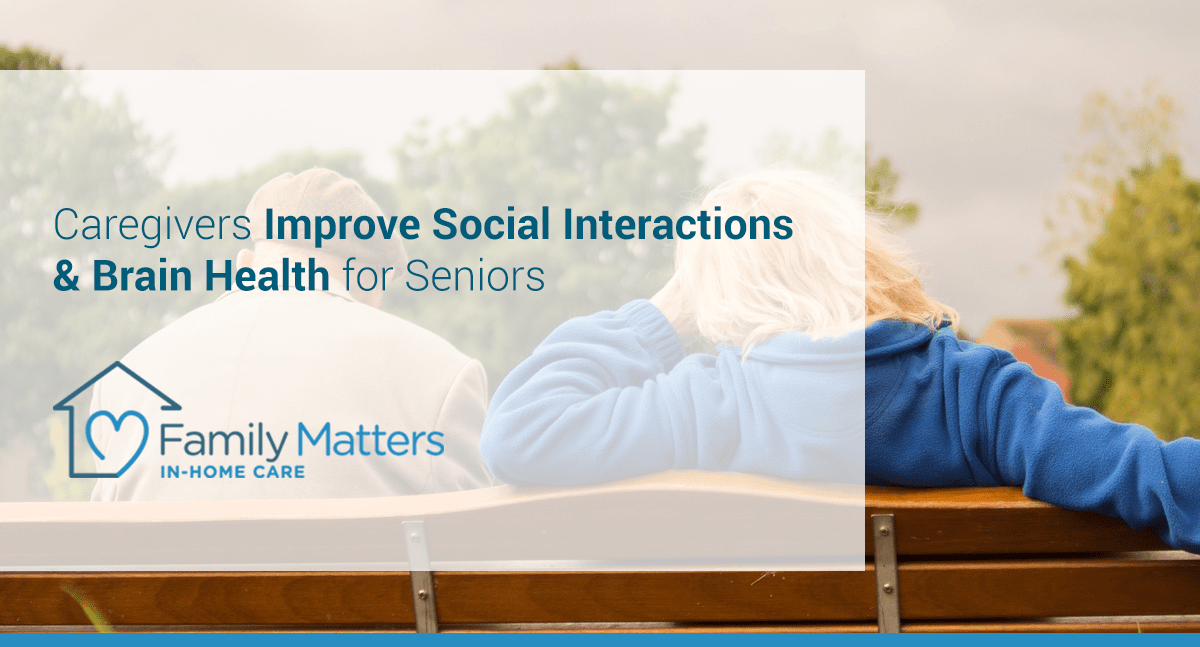
Caregivers Improve Social Interactions & Brain Health for Seniors
Caregivers can improve brain health for seniors through social interaction. The relationships they build and activities they provide can keep the senior’s brain active, healthy and ward off depression. Numerous clinical studies have found that friendships help to safeguard good health in later years. As caregivers provide companionship, they contribute to a senior’s long-term well-being.
A study in American Sociological Review discussed the benefit of high-quality relationships and friendships on seniors’ well-being. Researchers found that the right relationships with friends and family are “more likely” to provide seniors with a “sense of belongingness, better self-esteem and well-being”. The benefits of rich friendships, as opposed to acquaintances, can provide unconditional social support and vastly improve a senior’s well-being and mental health.
Dr. Valerie Crooks, director of clinical trials at the Southern California Permanente Medical Group studied women who were 78 years old and older who did not have dementia, for five years. She discovered that women with the “strongest social networks were less like to develop symptoms of dementia”. The strength of the social network was a key factor was created by the frequency with which women kept in touch with friends and family and confided in them. The stronger the social network, the healthier a woman’s brain tended to remain.
Why do social networks make a difference? When seniors have friends they tend to participate more in activities that benefit body and mind. They are more apt to be part of a book group, walking group or other social activities. They are more apt to talk with friends frequently, expressing their joys and concerns which can help to ward off depression and anxiety. A social network also gives seniors access to a greater number of resources and support.
A study at Michigan State University underscored the power of friendship on physical and mental health. Researchers surveyed nearly 272,000 people about relationships, happiness and health. They found that friendships, as opposed to relationships with family members, are the most beneficial for seniors. Whereas family members may have a sense of obligation to stay in touch with a senior, friendships remain a source of joy. Researchers found that valued friendships were directly related to “better functioning, particularly among older adults”. On the other hand, relationships with family members could be a “static influence on a senior’s health and well-being.”
This is not to say that family relationships aren’t important, because they are an essential part of every seniors support network. However, this particular body of research found that while both friends and family contribute to a senior’s overall health and happiness “only friendships became a stronger predictor of health and happiness at advanced ages.”
That’s where caregivers and companions come in. When professional caregivers are carefully matched to the personality and needs of a senior, companionship takes place and a friendship can grow. It’s not only the support of daily activities that improves the senior’s quality of life, it’s the conversations and engagement that take place.
Brain health is essential to reducing health risks that impact the brain. The more that the brain learns, plays and concentrates, the more it retains its abilities as we age. Good nutrition, physical activity and managing chronic disease like diabetes can also keep the brain healthy. Experienced caregivers can help seniors to practice these healthy habits. Walking and eating right is always easier when doing it with another person and steady companionship, instead of trying to do them alone.
The right caregiver can enhance a senior’s quality of life and enhance brain health. The relationships and friendships that develop can improve well-being for many years.
If you or your family member is considering in-home care as part of a plan to age in place, contact Family Matters In-Home Care today for a free consultation. Our team is dedicated to supporting your family and helping older adults enjoy life in the comfort of their own home for as long as possible.
Some of the services offered by Family Matter In-Home Care include: Alzheimer’s & Dementia Care, Bed & Wheelchair Transfer Assistance, Companionship, Housekeeping & Meal Preparation, Personal Care, Recovery Care, and Transportation.
